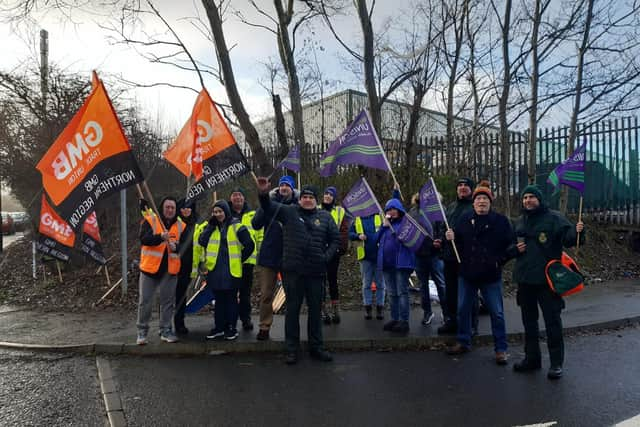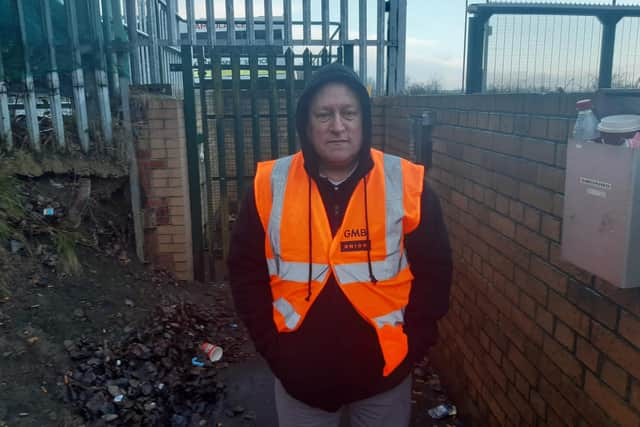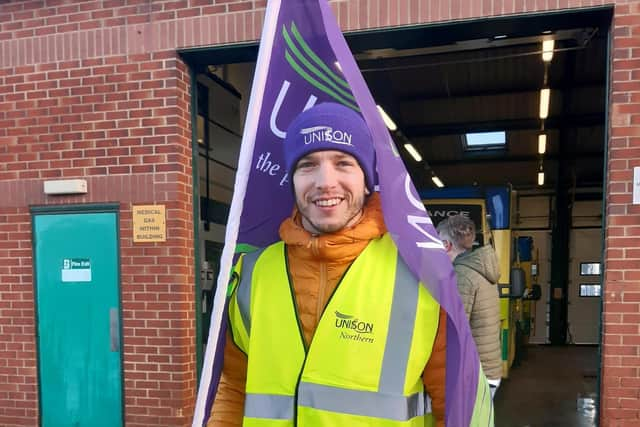Watch as NEAS staff on picket line in Sunderland demand fair pay deal and funding for the NHS
and live on Freeview channel 276
NEAS paramedics, call handlers, drivers and technicians from the Unison and GMB unions were among the estimated 25,000 ambulance workers nationally taking industrial action today (Wednesday January 11), in a second day of strikes.
GMB regional organiser Mark Wilson, 52, said the action was a “last resort” for his members, after the Government had “failed to make them a meaningful offer”.
Advertisement
Hide AdAdvertisement
Hide AdHe said: “The unions met with Rishi Sunak on Monday and nothing came out of that. This group of workers are not militant activists. They do this job because they care for their patients and feel they have been left with no other option but to take industrial action.
"For years NEAS workers have received a real terms pay cut. All they want is fair pay which is in line with the current rate of inflation, although we are willing to listen to any serious and reasonable offer.”
For Unison regional organiser and NEAS lead, Miles Elliot, 33, the issue of pay is also behind the critical incident announced by the region’s ambulance service last month as patients experienced “significant delays”.
He said: “This is not a decision our members have taken lightly. It is a last resort. As well as asking for a fair pay rise this action is also about raising the issue of the current staffing crisis being experienced in the NHS.


Advertisement
Hide AdAdvertisement
Hide Ad"There are record levels of vacancies which is why it is so important to get pay levels right. For many NEAS staff it has got to the point where enough is enough and they are leaving for better paid less stressful jobs.
"The reason we are seeing ambulances queuing outside of hospitals is because there simply isn’t enough staff.”
It’s a sentiment shared by Mark who added: “There are undoubted staffing issues due to under-funding which is leading to patient delays which our members are also unhappy about. There is a shortage of staff and NEAS are even having to buy or rent vehicles from St John’s Ambulance.
"It’s a landmark day to see NEAS staff feel the need to take industrial action and the Government and Minister for Health need to find the funding to settle this dispute.


Advertisement
Hide AdAdvertisement
Hide Ad"The only way to resolve this is to get around the table for meaningful discussions.”
Responding to the strike, Health and Social Care Secretary Steve Barclay said: “Today’s ambulance strike is an unwelcome return to unnecessary disruption and comes at a time when the NHS is already under huge pressure from Covid and flu.
“While we have contingency plans in place, including support from the military, community first responders and extra call handlers, to mitigate risks to patient safety, there will inevitably be some disruption for patients with fewer ambulances on the road.


“Patients should continue to call 999 for life-saving care and use NHS 111 online services for urgent health advice.”
It is hoped the ‘staggered strike’ called by unions will allow NEAS workers to continue to respond to life threatening emergencies.
